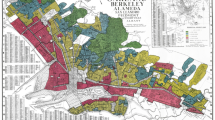Abstract
Although the Department of Sociology at the University of Chicago wasnever known as a center for sociological theory, major contributions were made in suchareas as social disorganization, human ecology and demography, urbanism,professions, institutional development, community organization anddevelopment, as well as criminology and deviance. These theoreticalcontributions did not qualify as grand theory, but all were in the Chicago tradition of theoretically interpretive empirical work. The Project onHuman Development in Chicago Neighborhoods – Chicago-style researchat its best – continues that tradition, wherever it is practiced and whateverits specific aims.
Similar content being viewed by others
References
Abbott, Andrew, and Emanuel Gaziano, “Transition and Tradition: Departmental Faculty in the Era of the Second Chicago School,” in G. Fine (ed.), A Second Chicago School? The Development of a Postwar American Sociology (Chicago: University of Chicago Press, 1997).
Anderson, Elijah, Streetwise: Race, Class, and Change in an Urban Community (Chicago: University of Chicago Press, 1990).
Bursik, Robert J. Jr., “Review of Poverty, Ethnicity, and Violent Crime, American Journal of Sociology 1998 (104), 906–907.
Bursik, Robert J. Jr., “Social Disorganization and Theories of Crime and Delinquency: Problems and Prospects,” Criminology 1988 (26), 519–551.
Castells, Manuel, The Informational City: Information Technology, Economic Restructuring and the Urban-Regional Process (New York: Blackwell, 1991).
Coleman, James S., “Social Capital in the Creation of Human Capital,” American Journal of Sociology 1988 (94), S95–S120.
Coleman, James S., Foundations of Social Theory (Cambridge,MA: Harvard University Press, 1990).
Finestone, Harold, “The Delinquent and Society: The Shaw and McKay Tradition,” in J. Short (ed.), Delinquency, Crime, and Society (Chicago: University of Chicago Press, 1976).
Hagedorn, John M. and Paul Goldstein, “Murder and Drugs in the Information Age: An Urban Political Economy Approach for Explaining Variation in Urban Homicide Rates,” paper delivered at the University of Illinois, Chicago, Great Cities Seminar, September 30, 1999.
Henry, Andrew F., and James F. Short, Jr., Suicide and Homicide: Some Economic, Sociological, and Psychological Aspects of Aggression (Glencoe, IL: Free Press, 1954).
Janowitz, Morris, The Last Half-Century: Societal Change and Politics in America (Chicago: University of Chicago Press, 1978).
Kasarda, John D. and Morris Janowitz, “Community Attachment in Mass Society,” American Sociological Review 1974 (39), 328–339.
LaFree, Gary, Losing Legitimacy: Street Crime and the Decline of Social Institutions in America (Boulder CO: Westview, 1998).
Sampson, Robert J., Jeffrey D. Morenoff and Felton Earls, “Beyond Social Capital: Structural Sources and Spatial Embeddedness of Collective Efficacy for Children,” American Sociological Review (forthcoming).
Sampson, Robert J., Stephen Raudenbush and Felton Earls, “Neighborhoods and Violent Crime: A Multilevel Study of Collective Efficacy,” Science 1997 (277), 918–924.
Sassen, Sassen, The Global City: New York, London, Tokyo (Princeton: Princeton University Press, 1991).
Sassen, Sassen, Cities in a World Economy (Thousand Oaks, CA: Pine Forge Press, 1994).
Short, James F. Jr., “The Level of Explanation Problem Revisited: The American Society of Criminology 1997 Presidential Address,” Criminology 1998 (326), 3–36.
Short, James F. Jr., Poverty, Ethnicity, and Violent Crime (Boulder, CO: Westview, 1997).
Short, James F. Jr., ed., The Social Fabric of the Metropolis: Contributions of the Chicago School of Urban Sociology (Chicago: University of Chicago Press, 1971).
Tittle, Charles R., “Theoretical Advances and Their Implications for Social Policy,” in Vol. I, Criminal Justice 2000 (Washington, DC: National Institute of Justice, 2000).
Toby, Jackson, “Social Disorganization and a Stake in Conformity,” Journal of Criminal Law, Criminology, and Police Science 1957 (48: May-June), 12–17.
Author information
Authors and Affiliations
Rights and permissions
About this article
Cite this article
Short, J.F. Criminology, the Chicago School, and sociological theory. Crime, Law and Social Change 37, 107–115 (2002). https://doi.org/10.1023/A:1014563616676
Issue Date:
DOI: https://doi.org/10.1023/A:1014563616676



